Why async and functional programming in PHP7 suck and how to get overr it?
- 1. Witek Adamus DocPlanner 2017, Warszawa
- 2. Why async and functional programming in PHP7 suck and how to get over it?
- 3. Who am I?
- 4. 5 years of imperative programming 2 years of functional programming Back to PHP7
- 5. ❏ WHY? ❏ What can functional programming bring to the table? ❏ WHAT? ❏ When language can be described as functional? ❏ PROBLEMS? ❏ Top sins of PHP ❏ SOLUTION? Table of content
- 6. WHY?
- 7. ❏ Higher quality? ❏ Speed / Scalability ❏ Less bugs ❏ Easy to reason about ❏ Predictability WHY?
- 8. WHY? Pros Cons Efficiency ??? Entry threshold ??? Mathematical description of reality ???
- 9. WHY? Pros Cons In result Efficiency Efficiency Scalability / Quality Entry threshold Entry threshold Let’s get the party started Mathematical description of reality Mathematical description of reality Shorter and more descriptive code
- 10. WHY? Pros Cons In result Efficiency Efficiency Scalability / Quality Entry threshold Entry threshold Let’s get the party started Mathematical description of reality Mathematical description of reality Shorter and more descriptive code INVEST AND WAIT FOR A DIVIDEND
- 11. public function someMethodWithMisleadingName( array $mysteriousInput){ $arr = []; foreach ($mysteriousInput as $inp) { if ($inp > 10) { $arr[] = $inp; } } $arrLeft = $arrRight = $arrCenter = []; foreach ($arr as $elem) { $bucket = $elem <=> 20; if ($bucket < 0) { $arrLeft[] = $elem; } if ($bucket == 0) { $arrCenter[] = $elem; } if ($bucket > 0) { $arrRight[] = $elem;} } $countLeft = count($arrLeft); $countCenter = count($arrCenter); $countRight = count($arrRight); return array_sum([$countLeft, $countCenter, $countRight]) / 3; }
- 12. public function someMethodWithMisleadingName( array $mysteriousInput) { $arr = []; foreach ($mysteriousInput as $inp) { if ($inp > 10) { $arr[] = $inp; } } $arrLeft = $arrRight = $arrCenter = []; foreach ($arr as $elem) { $bucket = $elem <=> 20; if ($bucket < 0) { $arrLeft[] = $elem; } if ($bucket == 0) { $arrCenter[] = $elem; } if ($bucket > 0) { $arrRight[] = $elem;} } $countLeft = count($arrLeft); $countCenter = count($arrCenter); $countRight = count($arrRight); return array_sum( [$countLeft, $countCenter, $countRight] ) / 3; } public function someMethodWithMisleadingName( ParallelListCollection $mysteriousInput) { return $mysteriousInput ->filter(function ($elem) { return $elem > 10; }) ->partition(function ($elem) { return $elem <=> 20; }) ->map(function ($bucket) { return $bucket->count(); }) ->avg(); }
- 13. public function someMethodWithMisleadingName( array $mysteriousInput) { $arr = []; foreach ($mysteriousInput as $inp) { if ($inp > 10) { $arr[] = $inp; } } $arrLeft = $arrRight = $arrCenter = []; foreach ($arr as $elem) { $bucket = $elem <=> 20; if ($bucket < 0) { $arrLeft[] = $elem; } if ($bucket == 0) { $arrCenter[] = $elem; } if ($bucket > 0) { $arrRight[] = $elem;} } $countLeft = count($arrLeft); $countCenter = count($arrCenter); $countRight = count($arrRight); return array_sum( [$countLeft, $countCenter, $countRight] ) / 3; } public function someMethodWithMisleadingName( ParallelListCollection $mysteriousInput) { return $mysteriousInput ->filter(function ($elem) { return $elem > 10; }) ->partition(function ($elem) { return $elem <=> 20; }) ->map(function ($bucket) { return $bucket->count(); }) ->avg(); }
- 14. WHAT? ❏ Function is a first-class citizen ❏ Lambda Calculus ❏ Immutability ❏ No side effects
- 15. First-class citizen ❏ Can be stored in variable and data structures ❏ Can be passed as a parameter to procedure/functions ❏ Can be returned by procedures/functions ❏ Can be instantiated inline ❏ Has it’s own identity (name independent)
- 16. Lambda Calculus ƛ(x) = z
- 17. Lambda Calculus ƛ(x) = z ❏ Higher-order functions ❏ Currying
- 18. Lambda Calculus ƛ(x) = z ❏ Higher-order functions ❏ Currying SWITCH YOUR THINKING FROM “HOW?” TO “WHAT?”
- 19. No side effects? Immutability? :(
- 20. Functional vs Object oriented programming ?
- 22. PHP7 is functional …but is dirty and salty as well
- 23. What do I miss in PHP7 that Scala luckily has?
- 24. ❏ Immutability by default ❏ Objects cloning ❏ Options ❏ Either ❏ Future ❏ Parallel collections ❏ Tail recurrency ❏ Generic types ❏ Arrow functions ❏ Pattern matching / case classes
- 25. https://github.com/php-slang/php-slang http://phpslang.io # composer require php-slang/php-slang
- 26. Few rules to make your code functional
- 27. Do not use ❏ reassignments ❏ if ❏ null ❏ for ❏ foreach
- 28. Quick pool ❏ Do you DDD?
- 29. Quick pool ❏ Do you DDD? ❏ Do you use setters?
- 30. Quick pool ❏ Do you DDD? ❏ Do you use setters? “VALUE OBJECTS are completely immutable.” Eric Evans
- 31. Do not use ❏ reassignments
- 32. $bigHouse = new Building(5);
- 33. $bigHouse = new Building(5); $smallerHouse = $bigHouse->setFloors(2); echo $bigHouse->getFloors(); echo $smallerHouse->getFloors();
- 34. $bigHouse = new Building(5); $smallerHouse = $bigHouse->setFloors(2); echo $bigHouse->getFloors(); //2 echo $smallerHouse->getFloors(); //2
- 35. class Building { protected $floors; public function __construct(int $floors) { $this->setFloors($floors); } public function getFloors() : int { return $this->floors; } public function setFloors(int $floors) : Building { $this->floors = $floors; return $this; } }
- 36. use PhpSlangUtilCopy; class Building { use Copy; protected $floors; public function __construct(int $floors) { $this->floors = $floors; } public function getFloors() : int { return $this->floors; } public function withFloors(int $floors) : Building { return $this->copy('floors', $floors); } }
- 37. $bigHouse = new Building(5); $smallerHouse = $bigHouse->withFloors(2); echo $bigHouse->getFloors(); //5 echo $smallerHouse->getFloors(); //2
- 38. $bigHouse = new Building(5); $smallerHouse = $bigHouse->withFloors(2); echo $bigHouse->getFloors(); //5 echo $smallerHouse->getFloors(); //2 REFERENTIALTRANSPARENCY
- 39. Referential transparency ❏ f(x, y) = (x+y) * y
- 40. Referential transparency ❏ f(x, y) = (x+y) * y x, y and a result can be a function as well
- 41. Referential transparency ❏ f(x, y) = (x+y) * y Eg. ❏ f(2, 4) = (2 + 4) * 4 = 8 * 4 = 32 ❏ f(1, 8) = (1 + 8) * 8 = 9 * 8 = 72
- 42. Referential transparency ❏ f(x, y) = (x+y) * y Eg. ❏ f(2, 4) = (2 + 4) * 4 = 8 * 4 = 32 ❏ f(1, 8) = (1 + 8) * 8 = 9 * 8 = 72 i = 71; ComputingService::_opCount++; comps.push(new Tuple2(x, y));
- 43. Referential transparency ❏ f(x, y) = (x+y) * y Eg. ❏ f(2, 4) = (2 + 4) * 4 = 8 * 4 = 32 ❏ f(1, 8) = (1 + 8) * 8 = 9 * 8 = 72 i = 71; ComputingService::_opCount++; comps.push(new Tuple2(x, y));
- 44. Few rules to make your code functional
- 45. Do not use :) reassignments ❏ if ❏ null ❏ for ❏ foreach
- 46. Do not use :) reassignments ❏ if ❏ null ❏ for ❏ foreach ?
- 47. Do not use :) reassignments ❏ if ❏ null ❏ for ❏ foreach Option
- 48. Option Monad which may contain something or nothing
- 49. What is a monad?
- 50. What is a monad?
- 51. What is a monad?
- 52. What is a monad?
- 53. What is a monad? map
- 54. What is a monad? flatMap
- 55. What is a monad?
- 60. public function findByEmail(string $email) : User { $user = $this->findOneBy(['email' => $email]); if (!$user instanceof User) { throw new NotFoundException("oh my"); } return $user; } try { return new Response(findByEmail($email), HTTP_OK); } catch (NotFoundException $exception) { return new Response([], HTTP_NOT_FOUND); }
- 61. public function findByEmail(string $email) : User { $user = $this->findOneBy(['email' => $email]); if (!$user instanceof User) { throw new NotFoundException("oh my"); } return $user; } try { return new Response(findByEmail($email), HTTP_OK); } catch (NotFoundException $exception) { return new Response([], HTTP_NOT_FOUND); } public function findByEmail(string $email) : Option { return Option::of($this->findOneBy(['email' => $email])); } return findByEmail($email)) ->map(function (User $user) { return new Response($user, HTTP_OK); }) ->getOrElse(new Response('', HTTP_NOT_FOUND));
- 62. public function findByEmail(string $email) : User { $user = $this->findOneBy(['email' => $email]); if (!$user instanceof User) { throw new NotFoundException("oh my"); } return $user; } try { return new Response(findByEmail($email), HTTP_OK); } catch (NotFoundException $exception) { return new Response([], HTTP_NOT_FOUND); } public function findByEmail(string $email) : Option { return Option::of($this->findOneBy(['email' => $email])); } return findByEmail($email)) ->map(function (User $user) { return new Response($user, HTTP_OK); }) ->getOrElse(new Response('', HTTP_NOT_FOUND)); map
- 64. public function findByEmail(string $email) : Option { return Option::of($this->findOneBy(['email' => $email])); } public function postalCode(string $email, PostalCode $default) : PostalCode { return findByEmail($email) ->map(function (User $user) { return $user->getProfile()->getAdress()->getPostalCode(); }) ->getOrElse($default); }
- 65. public function postalCode(string $email, PostalCode $default) : PostalCode { return findByEmail($email); ->map(function (User $user) { return $user->getProfile()->getAdress()->getPostalCode(); }) ->getOrElse($default); }
- 66. public function postalCode(string $email, PostalCode $default) : PostalCode { return findByEmail($email) ->flatMap(function (User $user) { return $user->getProfile(); }) ->flatMap(function (UserProfile $userProfile) { return $userProfile->getAdress(); }) ->flatMap(function (Adress $adress) { return $adress->getPostalCode(); }) ->getOrElse($default); }
- 67. public function postalCode(string $email, PostalCode $default) : PostalCode { return findByEmail($email) ->flatMap(function (User $user) { return $user->getProfile(); }) ->flatMap(function (UserProfile $userProfile) { return $userProfile->getAdress(); }) ->flatMap(function (Adress $adress) { return $adress->getPostalCode(); }) ->getOrElse($default); } flatMap
- 68. Few rules to make your code functional
- 69. Do not use :) reassignments :) if :) null ❏ for ❏ foreach
- 70. Shortened notation for anonymous functions
- 71. public function displayNameForUser(string $email) : string { return $this ->userRepository ->findByEmail($email) ->flatMap(function (User $user) { return $user->getFirstName(); }) ->getOrCall(function () use (string $email) : string { return $this->getSomethingElseWith($email); }); }
- 72. public function displayNameForUser(string $email) : string { return $this ->userRepository ->findByEmail($email) ->flatMap(function (User $user) { return $user->getFirstName(); }) ->getOrCall(function () use (string $email) : string { return $this->getSomethingElseWith($email); }); }
- 73. public displayNameForUser(string email) : string userRepository ->findByEmail(email) ->flatMap(_->getFirstName) ->getOrCall(getSomethingElseWith(email)) :(
- 74. public def displayNameForUser(email : string) : string = userRepository .findByEmail(email) .flatMap(_.getFirstName) .getOrElse(_ => getSomethingElseWith(email)) :)
- 75. public function displayNameForUser(string $email) : string { return $this ->userRepository ->findByEmail($email) ->flatMap(Extract($user)->getFirstName()) ->getOrCall(Extract($this)->getSomethingElseWith($email)); } NYI :)
- 76. Generic types
- 77. public function maybeSomething(string $email) : Option { ... }
- 78. /** * @return Option<string> */ public function maybeSomething(string $email) : Option { ... } https://github.com/phpDocumentor/fig-standards/blob/master/proposed/phpdoc.md :(
- 79. public function maybeSomething(string $email) : Option<string> { ... } :o
- 80. public function maybeSomething(string $email) : Option<string> { ... } ❏ Version: 0.4.0 ❏ Date: 2016-01-06 ❏ Author: ❏ Ben Scholzen 'DASPRiD' [email protected], ❏ Rasmus Schultz [email protected] ❏ Status: Draft ❏ First Published at: http://wiki.php.net/rfc/generics :(
- 81. public function maybeSomething(string $email) : Option<string> { ... } WANT TO EARN EXTRA $1020 ? https://www.bountysource.com/issues/20553561-add-generics-support :~|
- 82. Syntax doesn’t matter thinking does Erlang guys
- 83. What do I miss in PHP7 that Scala luckily has?
- 84. :/ Immutability by default :) Objects cloning :) Options ❏ Either ❏ Future ❏ Parallel collections ❏ Tail recurrency :( Generic types :( Arrow functions ❏ Pattern matching / case classes
- 85. Either
- 87. Either Either RightLeft left(Closure $expr): Either right(Closure $expr): Either get() left(Closure $expr): Either right(Closure $expr): Either get()
- 88. Either Either RightLeft left(Closure $expr): Either right(Closure $expr): Either get() left(Closure $expr): Either right(Closure $expr): Either get() SEMANTICS!
- 89. What do I miss in PHP7 that Scala luckily has?
- 90. :/ Immutability by default :) Objects cloning :) Options :) Either ❏ Future ❏ Parallel collections ❏ Tail recurrency :( Generic types :( Arrow functions ❏ Pattern matching / case classes
- 91. Pattern Matching
- 92. Pattern matching Result Variant 1 Variant 2 Variant 3 Variant N ...
- 93. return (Match::of($someKindResult)) ->match( new Case(IvalidInput::class, new Response('', HTTP_BAD_REQUEST)), new Case(NotFound::class, new Response('',HTTP_NOT_FOUND), new Default(function () use ($someKindResult) { return new Response($someKindResult, HTTP_OK); }) );
- 94. What do I miss in PHP7 that Scala luckily has?
- 95. :/ Immutability by default :) Objects cloning :) Options :) Either ❏ Future ❏ Parallel collections ❏ Tail recurrency :( Generic types :( Arrow functions :)/:( Pattern matching / case classes
- 98. public function beautifulMultiplyOddsBy( array $input, float $multiplication) : ListCollection { return (new ListCollection($input)) ->filter(function ($number) { return $number % 2 !== 0; }) ->map(function ($number) use ($multiplication) { return $number * $multiplication; }); }
- 99. public function accumulatedText(array $words) : string { $text = ''; foreach ($words as $word) { $text .= $word . ' '; } return $text; } public function accumulatedText(array $words) : string { return (new ListCollection($words)) ->fold('', function (string $acumulator, string $word) { return $acumulator . $word . ' '; }); }
- 100. (new ListCollection([1,2,3,4]))->tail(); //ListCollection([2,3,4]) (new ListCollection([1,2,3,4]))->every(2); //ListCollection([2,4]) (new ListCollection([1,2,3,4]))->groups(2); ListCollection([ ListCollection([1,2]), ListCollection([3,4]), ])
- 101. Few rules to make your code functional
- 102. Do not use :) reassignments :) if :) null :) for :) foreach
- 106. Future
- 107. public function nonBlockingGet(string $id): Future { ... } public function exampleAction(string $id1) : Response { return $this ->nonBlockingService ->nonBlockingGet($id) ->map(function (NonBlockingGetResult $output) { return new Response($output); }) ->await(); }
- 108. public function nonBlockingGet(string $id): Future { ... } public function exampleAction(string $id1) : Response { return $this ->nonBlockingService ->nonBlockingGet($id) ->map(function (NonBlockingGetResult $output) { return new Response($output); }) ->await(); } Future<NonBlockingGetResult> NYI
- 109. public function nonBlockingGet(string $id): Future { ... } public function exampleAction(string $id1) : Response { return $this ->nonBlockingService ->nonBlockingGet($id) ->map(function (NonBlockingGetResult $output) { return new Response($output); }) ->await(); } Future<NonBlockingGetResult> NYI Future<Response>
- 110. public function nonBlockingGet(string $id): Future { ... } public function exampleAction(string $id1) : Response { return $this ->nonBlockingService ->nonBlockingGet($id) ->map(function (NonBlockingGetResult $output) { return new Response($output); }) ->await(); } Future<NonBlockingGetResult> NYI Future<Response> Response
- 111. public function nonBlockingGet(string $id): Future { ... } public function exampleAction(string $id1, string $id2, string $id3) : Response { return Future::all([ $this->nonBlockingService1->nonBlockingGet($id1), $this->nonBlockingService2->nonBlockingGet($id2), $this->nonBlockingService3->nonBlockingGet($id3), ]) ->map(function ($output) { return new Response($output); }) ->await(); } NYI
- 112. Future & Parallel collections
- 113. use PhpSlangCollectionListCollection; ... public function beautifulMultiplyBy(array $input, float $multiplication) : ListCollection { return (new ListCollection($input)) ->map(function ($number) use ($multiplication) { return $number * $multiplication; }); }
- 114. use PhpSlangCollectionParallelListCollection; ... public function beautifulMultiplyBy(array $input, float $multiplication) : ParallelListCollection { return (new ParallelListCollection($input)) ->map(function ($number) use ($multiplication) { return $number * $multiplication; }); }
- 115. use PhpSlangCollectionListCollection; ... public function asyncChainedComputationExample(array $input) : ListCollection { return (new ListCollection($input)) ->map($this->transformationOne()); } use PhpSlangCollectionParallelListCollection; ... public function asyncChainedComputationExample(array $input) : ParallelListCollection { return (new ParallelListCollection($input)) ->map($this->transformationOne()); }
- 116. use PhpSlangCollectionListCollection; ... public function asyncChainedComputationExample(array $input) : ListCollection { return (new ListCollection($input)) ->map($this->transformationOne()); } use PhpSlangCollectionParallelListCollection; ... public function asyncChainedComputationExample(array $input) : ParallelListCollection { return (new ParallelListCollection($input)) ->map($this->transformationOne()); }
- 117. use PhpSlangCollectionParallelListCollection; ... public function asyncChainedComputationExample(array $input) : ParallelListCollection { return (new ParallelListCollection($input)) ->map($this->transformationOne()); } CPU vs IO
- 118. use PhpSlangCollectionParallelListCollection; ... public function asyncChainedComputationExample(array $input) : ParallelListCollection { return (new ParallelListCollection($input)) ->map($this->transformationOne()) ->map($this->transformationTwo()) ->map($this->transformationThree(); }
- 119. use PhpSlangCollectionParallelListCollection; ... public function asyncChainedComputationExample(array $input) : ParallelListCollection { return (new ParallelListCollection($input)) ->map(function ($number) { return new Some($number) ->map($this->transformationOne()) ->map($this->transformationTwo()) ->map($this->transformationThree() ->get(); }); }
- 120. use PhpSlangCollectionParallelListCollection; … public function asyncChainedComputationExample(array $input) : ParallelListCollection { return (new ParallelListCollection($input)) ->map(function ($number) { return new Some($number) ->map($this->transformationOne()) ->map($this->transformationTwo()) ->map($this->transformationThree() ->get(); }); }
- 121. What do I miss in PHP7 that Scala luckily has?
- 122. :/ Immutability by default :) Objects cloning :) Options :) Either :/ Future :) Parallel collections ❏ Tail recurrency :( Generic types :( Arrow functions :)/:( Pattern matching / case classes
- 123. Tail recurrency
- 124. def fibonacci(index : Int) : Int = index match { case 0 | 1 => index case _ => fibonacci(index - 1 ) + fibonacci(index - 2) } function fibonacci(int $index) : int { return in_array($index, [0, 1]) ? $index : fibonacci($index - 1) + fibonacci($index - 2); }
- 125. def fibonacci(index : Int) : Int = index match { case 0 | 1 => index case _ => fibonacci(index - 1 ) + fibonacci(index - 2) } function fibonacci(int $index) : int { return in_array($index, [0, 1]) ? $index : fibonacci($index - 1) + fibonacci($index - 2); } echo fibonacci(123123123123); Fatal error: Maximum function nesting level of '...' reached, aborting!
- 127. def fibonacci(index: Int): Int = { var a = 0 var b = 1 var i = 0 while (i < index) { val c = a + b a = b b = c i = i + 1 } return a } function fibonacci(int $index) : int { $a = 0; $b = 1; $i = 0; while ($i < $index) { $c = $a + $b; $a = $b; $b = $c; $i += 1; } return $a; }
- 128. def recursiveFibonacci(n: Int, a:Int, b:Int): Int = n match { case 0 => a case _ => recursiveFibonacci( n-1, b, a+b ) } def fibonacci( n : Int) : Int = recursiveFibonacci( n, 0, 1) function recursiveFibonacci(int $n, int $a, int $b) { return ($n == 0) ? $a : recursiveFibonacci($n - 1, $b, $a + $b); } function fibonacci(int $n) : int { return recursiveFibonacci($n, 0, 1); }
- 129. def fibonacci(index : Int) : Int = index match { case 0 | 1 => index case _ => fibonacci(index - 1 ) + fibonacci(index - 2) } function fibonacci(int $index) : int { return in_array($index, [0, 1]) ? $index : fibonacci($index - 1) + fibonacci($index - 2); }
- 130. @tailrec def recursiveFibonacci(n: Int, a:Int, b:Int): Int = n match { case 0 => a case _ => recursiveFibonacci( n-1, b, a+b ) } def fibonacci( n : Int) : Int = recursiveFibonacci( n, 0, 1) function recursiveFibonacci(int $n, int $a, int $b) { return ($n == 0) ? $a : recursiveFibonacci($n - 1, $b, $a + $b); } function fibonacci(int $n) : int { return recursiveFibonacci($n, 0, 1); } :( :)
- 132. Recurrency
- 134. function recursiveFibonacci(int $n, int $a, int $b) { return ($n == 0) ? $a : recursiveFibonacci($n - 1, $b, $a + $b); } function fibonacci($n) { return recursiveFibonacci($n, 0, 1); }
- 135. function recursiveFibonacci(int $n, int $a, int $b) { return ($n == 0) ? new Done($a) : new Bounce(function () use ($n, $b, $a) { return recursiveFibonacci($n - 1, $b, $a + $b); }); } function fibonacci($n) { return (new Trampoline(function () use ($n) { return recursiveFibonacci($n, 0, 1); }))->run(); }
- 137. What do I miss in PHP7 that Scala luckily has?
- 138. :/ Immutability by default :) Objects cloning :) Options :) Either :/ Future :) Parallel collections :) Tail recurrency :( Generic types :( Arrow functions :)/:( Pattern matching / case classes
- 140. Conclusions ● Don’t be afraid of monads ● Care about transparency (especially referential) ● Learn Haskell, Clojure, Scala, F#, JavaScript -> TypeScript




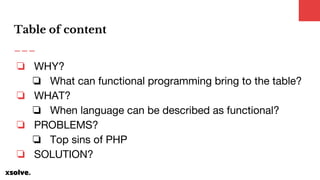





![public function someMethodWithMisleadingName(
array $mysteriousInput){
$arr = [];
foreach ($mysteriousInput as $inp) {
if ($inp > 10) { $arr[] = $inp; }
}
$arrLeft = $arrRight = $arrCenter = [];
foreach ($arr as $elem) {
$bucket = $elem <=> 20;
if ($bucket < 0) { $arrLeft[] = $elem; }
if ($bucket == 0) { $arrCenter[] = $elem; }
if ($bucket > 0) { $arrRight[] = $elem;}
}
$countLeft = count($arrLeft);
$countCenter = count($arrCenter);
$countRight = count($arrRight);
return array_sum([$countLeft, $countCenter, $countRight]) / 3;
}](https://image.slidesharecdn.com/docplanner2017-phpslang-witekadamus1-170212184212/85/Why-async-and-functional-programming-in-PHP7-suck-and-how-to-get-overr-it-11-320.jpg)
![public function someMethodWithMisleadingName(
array $mysteriousInput) {
$arr = [];
foreach ($mysteriousInput as $inp) {
if ($inp > 10) { $arr[] = $inp; }
}
$arrLeft = $arrRight = $arrCenter = [];
foreach ($arr as $elem) {
$bucket = $elem <=> 20;
if ($bucket < 0) { $arrLeft[] = $elem; }
if ($bucket == 0) { $arrCenter[] = $elem; }
if ($bucket > 0) { $arrRight[] = $elem;}
}
$countLeft = count($arrLeft);
$countCenter = count($arrCenter);
$countRight = count($arrRight);
return array_sum(
[$countLeft, $countCenter, $countRight]
) / 3;
}
public function
someMethodWithMisleadingName(
ParallelListCollection $mysteriousInput) {
return $mysteriousInput
->filter(function ($elem) {
return $elem > 10;
})
->partition(function ($elem) {
return $elem <=> 20;
})
->map(function ($bucket) {
return $bucket->count();
})
->avg();
}](https://image.slidesharecdn.com/docplanner2017-phpslang-witekadamus1-170212184212/85/Why-async-and-functional-programming-in-PHP7-suck-and-how-to-get-overr-it-12-320.jpg)
![public function someMethodWithMisleadingName(
array $mysteriousInput) {
$arr = [];
foreach ($mysteriousInput as $inp) {
if ($inp > 10) { $arr[] = $inp; }
}
$arrLeft = $arrRight = $arrCenter = [];
foreach ($arr as $elem) {
$bucket = $elem <=> 20;
if ($bucket < 0) { $arrLeft[] = $elem; }
if ($bucket == 0) { $arrCenter[] = $elem; }
if ($bucket > 0) { $arrRight[] = $elem;}
}
$countLeft = count($arrLeft);
$countCenter = count($arrCenter);
$countRight = count($arrRight);
return array_sum(
[$countLeft, $countCenter, $countRight]
) / 3;
}
public function
someMethodWithMisleadingName(
ParallelListCollection $mysteriousInput) {
return $mysteriousInput
->filter(function ($elem) {
return $elem > 10;
})
->partition(function ($elem) {
return $elem <=> 20;
})
->map(function ($bucket) {
return $bucket->count();
})
->avg();
}](https://image.slidesharecdn.com/docplanner2017-phpslang-witekadamus1-170212184212/85/Why-async-and-functional-programming-in-PHP7-suck-and-how-to-get-overr-it-13-320.jpg)


























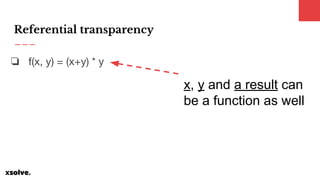



















![public function findByEmail(string $email) : User
{
$user = $this->findOneBy(['email' => $email]);
if (!$user instanceof User) {
throw new NotFoundException("oh my");
}
return $user;
}
try {
return new Response(findByEmail($email), HTTP_OK);
} catch (NotFoundException $exception) {
return new Response([], HTTP_NOT_FOUND);
}](https://image.slidesharecdn.com/docplanner2017-phpslang-witekadamus1-170212184212/85/Why-async-and-functional-programming-in-PHP7-suck-and-how-to-get-overr-it-60-320.jpg)
![public function findByEmail(string $email) : User
{
$user = $this->findOneBy(['email' => $email]);
if (!$user instanceof User) {
throw new NotFoundException("oh my");
}
return $user;
}
try {
return new Response(findByEmail($email), HTTP_OK);
} catch (NotFoundException $exception) {
return new Response([], HTTP_NOT_FOUND);
}
public function findByEmail(string $email) : Option
{
return Option::of($this->findOneBy(['email' => $email]));
}
return findByEmail($email))
->map(function (User $user) {
return new Response($user, HTTP_OK);
})
->getOrElse(new Response('', HTTP_NOT_FOUND));](https://image.slidesharecdn.com/docplanner2017-phpslang-witekadamus1-170212184212/85/Why-async-and-functional-programming-in-PHP7-suck-and-how-to-get-overr-it-61-320.jpg)
![public function findByEmail(string $email) : User
{
$user = $this->findOneBy(['email' => $email]);
if (!$user instanceof User) {
throw new NotFoundException("oh my");
}
return $user;
}
try {
return new Response(findByEmail($email), HTTP_OK);
} catch (NotFoundException $exception) {
return new Response([], HTTP_NOT_FOUND);
}
public function findByEmail(string $email) : Option
{
return Option::of($this->findOneBy(['email' => $email]));
}
return findByEmail($email))
->map(function (User $user) {
return new Response($user, HTTP_OK);
})
->getOrElse(new Response('', HTTP_NOT_FOUND));
map](https://image.slidesharecdn.com/docplanner2017-phpslang-witekadamus1-170212184212/85/Why-async-and-functional-programming-in-PHP7-suck-and-how-to-get-overr-it-62-320.jpg)

![public function findByEmail(string $email) : Option
{
return Option::of($this->findOneBy(['email' => $email]));
}
public function postalCode(string $email, PostalCode $default) : PostalCode
{
return findByEmail($email)
->map(function (User $user) {
return $user->getProfile()->getAdress()->getPostalCode();
})
->getOrElse($default);
}](https://image.slidesharecdn.com/docplanner2017-phpslang-witekadamus1-170212184212/85/Why-async-and-functional-programming-in-PHP7-suck-and-how-to-get-overr-it-64-320.jpg)






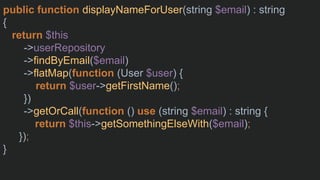


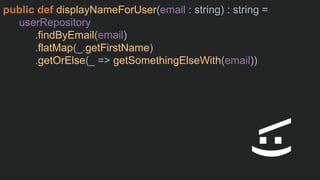

























![(new ListCollection([1,2,3,4]))->tail(); //ListCollection([2,3,4])
(new ListCollection([1,2,3,4]))->every(2); //ListCollection([2,4])
(new ListCollection([1,2,3,4]))->groups(2);
ListCollection([
ListCollection([1,2]),
ListCollection([3,4]),
])](https://image.slidesharecdn.com/docplanner2017-phpslang-witekadamus1-170212184212/85/Why-async-and-functional-programming-in-PHP7-suck-and-how-to-get-overr-it-100-320.jpg)










![public function nonBlockingGet(string $id): Future
{
...
}
public function exampleAction(string $id1, string $id2, string $id3) : Response
{
return Future::all([
$this->nonBlockingService1->nonBlockingGet($id1),
$this->nonBlockingService2->nonBlockingGet($id2),
$this->nonBlockingService3->nonBlockingGet($id3),
])
->map(function ($output) {
return new Response($output);
})
->await();
}
NYI](https://image.slidesharecdn.com/docplanner2017-phpslang-witekadamus1-170212184212/85/Why-async-and-functional-programming-in-PHP7-suck-and-how-to-get-overr-it-111-320.jpg)












![def fibonacci(index : Int) : Int =
index match {
case 0 | 1 => index
case _ => fibonacci(index - 1 ) + fibonacci(index - 2)
}
function fibonacci(int $index) : int
{
return in_array($index, [0, 1])
? $index
: fibonacci($index - 1) + fibonacci($index - 2);
}](https://image.slidesharecdn.com/docplanner2017-phpslang-witekadamus1-170212184212/85/Why-async-and-functional-programming-in-PHP7-suck-and-how-to-get-overr-it-124-320.jpg)
![def fibonacci(index : Int) : Int =
index match {
case 0 | 1 => index
case _ => fibonacci(index - 1 ) + fibonacci(index - 2)
}
function fibonacci(int $index) : int
{
return in_array($index, [0, 1])
? $index
: fibonacci($index - 1) + fibonacci($index - 2);
}
echo fibonacci(123123123123);
Fatal error: Maximum function nesting level of '...' reached, aborting!](https://image.slidesharecdn.com/docplanner2017-phpslang-witekadamus1-170212184212/85/Why-async-and-functional-programming-in-PHP7-suck-and-how-to-get-overr-it-125-320.jpg)


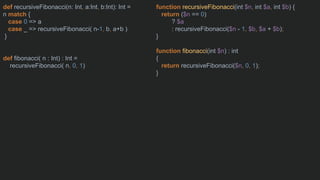
![def fibonacci(index : Int) : Int =
index match {
case 0 | 1 => index
case _ => fibonacci(index - 1 ) + fibonacci(index - 2)
}
function fibonacci(int $index) : int
{
return in_array($index, [0, 1])
? $index
: fibonacci($index - 1) + fibonacci($index - 2);
}](https://image.slidesharecdn.com/docplanner2017-phpslang-witekadamus1-170212184212/85/Why-async-and-functional-programming-in-PHP7-suck-and-how-to-get-overr-it-129-320.jpg)











